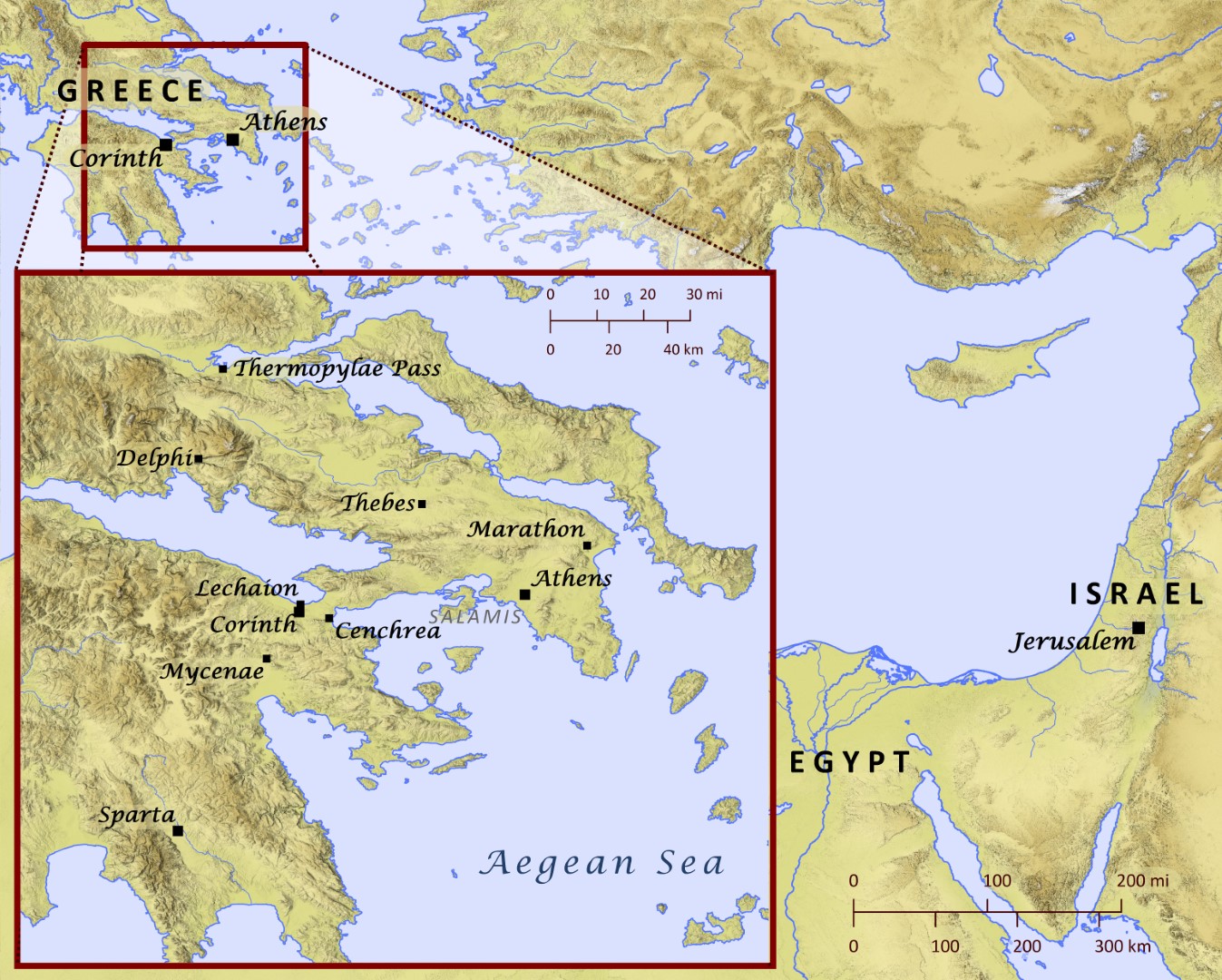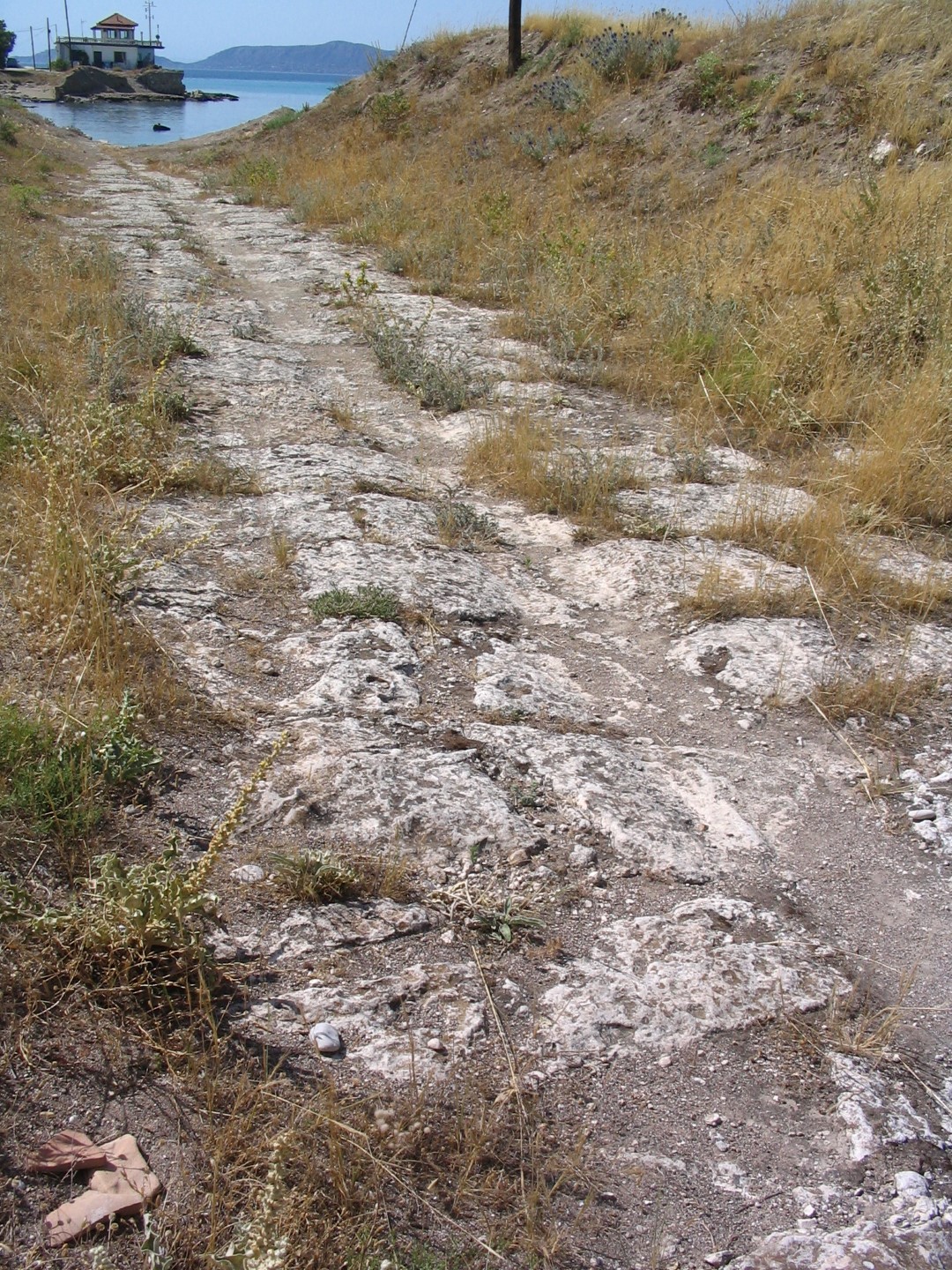For this series of studies you might need a board or some sort of display.
Where was Corinth?
https://biblemapper.com/blog/index.php/2020/01/10/southern-greece/

Corinth is on the coast towards the far end of Greece, on the Corinthian Gulf which leads from the Ionian Sea on the west, to the Aegean Sea to the east. Separating them by a strip of land only 4 miles wide.


To avoid an additional trip of up to 430 miles for traffic from Italy heading for Athens and the lands to the east, many goods were unloaded at Corinth and taken by wagon across the Isthmus. Smaller ships, fully laden, were dragged over a stone trackway laid about 600 B.C..
In Roman times, rollers were used under the vessels.
(A canal was finally built in 1893, but these days it is too narrow to be of much commercial use).
In some respects the Greek city of Corinth was similar to Plymouth: a busy harbour with a strong maritime history; but its population was doubled by the number of slaves there.
How was the church started?
To answer that we should turn to Acts 18
Someone read Acts 18:1-8
1 After this, Paul left Athens and went to Corinth. 2 There he met a Jew named Aquila, a native of Pontus, who had recently come from Italy with his wife Priscilla, because Claudius had ordered all Jews to leave Rome. Paul went to see them, 3 and because he was a tentmaker as they were, he stayed and worked with them. 4 Every Sabbath he reasoned in the synagogue, trying to persuade Jews and Greeks.
5 When Silas and Timothy came from Macedonia, Paul devoted himself exclusively to preaching, testifying to the Jews that Jesus was the Messiah. 6 But when they opposed Paul and became abusive, he shook out his clothes in protest and said to them, ‘Your blood be on your own heads! I am innocent of it. From now on I will go to the Gentiles.’
7 Then Paul left the synagogue and went next door to the house of Titius Justus, a worshipper of God. 8 Crispus, the synagogue leader, and his entire household believed in the Lord; and many of the Corinthians who heard Paul believed and were baptised.
Look at the start of verse 8 again.
Once Crispus had been converted, and was obviously now on Paul’s side, I guess he could no longer remain as synagogue leader, and so was replaced by a man called Sosthenes (who we will shortly meet again).
Read Acts 18:9-17
9 One night the Lord spoke to Paul in a vision: ‘Do not be afraid; keep on speaking, do not be silent. 10 For I am with you, and no one is going to attack and harm you, because I have many people in this city.’ 11 So Paul stayed in Corinth for a year and a half, teaching them the word of God.
12 While Gallio was proconsul of Achaia, the Jews of Corinth made a united attack on Paul and brought him to the place of judgment. 13 ‘This man,’ they charged, ‘is persuading the people to worship God in ways contrary to the law.’
14 Just as Paul was about to speak, Gallio said to them, ‘If you Jews were making a complaint about some misdemeanour or serious crime, it would be reasonable for me to listen to you. 15 But since it involves questions about words and names and your own law – settle the matter yourselves. I will not be a judge of such things.’ 16 So he drove them off. 17 Then the crowd there turned on Sosthenes the synagogue leader and beat him in front of the proconsul; and Gallio showed no concern whatever.
What then happened to Sosthenes?
We can only imagine, but look at 1 Corinthians 1:1
It is possible that this Sosthenes was the same synagogue leader who now joined Paul in his concern for the church in Corinth.
Now read 1 Corinthians 1:1-9
1 Paul, called to be an apostle of Christ Jesus by the will of God, and our brother Sosthenes,
2 To the church of God in Corinth, to those sanctified in Christ Jesus and called to be holy, together with all those everywhere who call on the name of our Lord Jesus Christ—their Lord and ours:
3 Grace and peace to you from God our Father and the Lord Jesus Christ.
4 I always thank God for you because of his grace given you in Christ Jesus.
5 For in him you have been enriched in every way—in all your speaking and in all your knowledge—6 because our testimony about Christ was confirmed in you. 7 Therefore you do not lack any spiritual gift as you eagerly wait for our Lord Jesus Christ to be revealed. 8 He will keep you strong to the end, so that you will be blameless on the day of our Lord Jesus Christ. 9 God, who has called you into fellowship with his Son Jesus Christ our Lord, is faithful.
Back to verse 1
Today we don’t tell people who is writing the letter until we get to the end. Very sensibly, in those days, the custom was to start with who the letter was from: in this case, Paul and Sosthenes.
1 Paul, called to be an apostle of Christ Jesus by the will of God, and our brother Sosthenes,
Paul immediately reminds his audience that he has the authority to write this letter as an Apostle – and not an Apostle by his own choosing, but he had been appointed to the task by the will of God.
Why was this important?
This wasn’t intended to be a chatty letter – it was written to address problems in the church, and Paul reminds them of his authority.
2 To the church of God in Corinth, to those sanctified in Christ Jesus and called to be holy, together with all those everywhere who call on the name of our Lord Jesus Christ—their Lord and ours:
Who is this letter intended for?
The Church in Corinth
The Church Worldwide
Us
Who are the church? (v2)
Those who have been sanctified in Christ Jesus and called to be holy, and who call on the name of our Lord Jesus Christ.
What does the word ‘sanctified’ mean?
The gold articles used in the Temple had been set apart for God – sanctified – for Temple use, and so were considered holy.
Verse 2 is a deliberate reminder from Paul that those he is writing to were set apart by Jesus to be a holy people. To live lives which are different to those they live among in the world.
Why does he have to do that? This is the point at which they were failing and the reason that he has to write this letter.
But the letter is also addressed to us. Are we failing here too? How holy should we be?
He has heard that there were several specific problems that needed addressing at the Church in Corinth:
1:10 – 4:21 Division
3:1–2 Immaturity & Instability
3:3 Jealousy / envy
5:1–13, 6:12–20 Sexual Immorality
6:1–11 Lawsuits
7:1–40 Marital difficulties
10:23 – 11:1 Misuse of freedom
12 – 14 Misuse of spiritual gifts
If there were problems at the church in Corinth, why should it be appropriate to send this letter to the other churches, and also record it for us to read today? (Check verse 2 again!)
The problems Paul faced at Corinth are still being faced in churches today.
But Paul also gives us encouragement at the end of verse 2 where he reminds us that if we face the same problems we can also call on the same Lord Jesus Christ — their Lord and ours.
What do you make of this next verse?
3 Grace and peace to you from God our Father and the Lord Jesus Christ.
Is Paul presumptuous in the way he says this?
Or is he simply stating fact?
Before looking at areas where the church is failing, he quickly reminds them that they are not condemned, but rather that God’s grace continues to cover every sin, and that they may continue to know his peace. When feelings of guilt and shame come over us because our sanctification seems such a slow process, it’s good to remember that God’s grace is unfailing, and because of that, we too can have his peace.
4 I always thank God for you because of his grace given you in Christ Jesus.
5 For in him you have been enriched in every way—in all your speaking and in all your knowledge—6 because our testimony about Christ was confirmed in you.
As Paul starts out to write this letter to a struggling church he breaks off to again give thanks to God that their salvation is all of God’s grace and doesn’t depend on man’s imperfect response. And he can find good things to say about them – that they are demonstrating gifts of the Holy Spirit in their lives: speaking (perhaps in tongues) and words of knowledge.
He also thanks God – for what? (v6)
The things that Paul and his companions said Jesus would do in their lives — how they would be changed if they accepted him — has been proved to be correct.
7 Therefore you do not lack any spiritual gift as you eagerly wait for our Lord Jesus Christ to be revealed.
Is that true of every Christian (you do not lack any spiritual gift)? Is it true of those in our church?
Or is it that all gifts are given, but not all are accepted or used?
We also need to be aware that the evidence of spiritual gifts in the people in our church is no guarantee that we won’t encounter problems.
In what way are we (or should we be) eagerly waiting for Jesus to be revealed?
8 He will keep you strong to the end, so that you will be blameless on the day of our Lord Jesus Christ. 9 God, who has called you into fellowship with his Son Jesus Christ our Lord, is faithful.
Again, Paul encourages the church that their sanctification is wholly in the hands of God and that he can be trusted to complete it.
If there are other translations available in your group, ask how the word ‘blameless’ is translated.
(Unreproveable, beyond reproach, guiltless and irreproachable, without crime, no one can accuse you of anything, faultless, no wrong in you, no condemnation, unimpeachable, free from all sin and guilt, unblameable.)
Blameless could also be translated un-indictable.
What does that mean?
On the day of judgement no-one could possibly bring any charge against us.
Jesus has taken the responsibility for everything we have ever done, and has suffered the punishment for all our sins.





